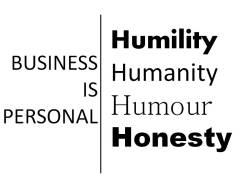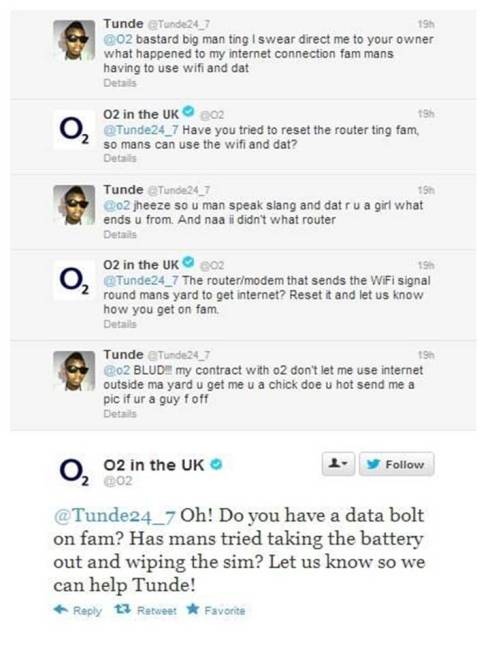The bigger the business, the more freedom is curtailed as governance, processes and procedures take over.
This is just one of the points made in a fascinating slideshare presentation from a few years ago on the culture at Netflix. And the upshot of all this? It becomes harder to be ‘human and the threat to freedom means you end up losing great people.
Which is ironic, really, considering that companies are mostly just collections of people. In the same way that without customers, there is no business, without workers there is no business too. And, when businesses try to put straight-jackets on great people, businesses ultimately fail.
Introducing the four ‘H’s
So, treat people well, give them the freedom to be themselves and customers will feel the difference, and everybody wins. It may be a cliché, but it’s no less true for all that, that people buy from people, whatever the business. How then, can businesses be more like people?
Consider then the 4 Hs. Done well, they reveal real – and therefore engaging – personality and help humanise the company, for customers
HUMILITY
This is about how great companies fess up to highly visible problems and failures. Put simply, there’s the old way – hide behind Ts and Cs, never admit anything, push failure behind the scenes and starve it of the oxygen of publicity – and there’s the new human and personal way, that involves someone very senior – typically the CEO – saying sorry and meaning it, and broadcasting the mea culpa too.
For example, check out two classic (and well handled) cases from the airline industry:
Here is an email and website message from the Singapore Airlines CEO, following a botched website launch in 2011. (See it here). It’s well written, personal and honest, and signed by the CEO. Job done!
In 2007, when bad weather disrupted air travel, flight delays and communications SNAFUs at Jet Blue caused a public outcry against the company. Soon after, the then-CEO issued an apology and also went onto Youtube, with “Our Promise To You”. This is the film, a very public and humble apology from the top. And the best quote? “We’ll be a better company, for the very difficult things our customers have had to endure”.
Admitting you’ve screwed up can be good for business. “Doing a Domino’s” became part of the language 3 years ago after Domino’s acknowledged that its pizzas “tasted like cardboard” and promised to do better. Read more about this classic and creative apology here at the CEB. The lesson? As the author says, “Humanize your apology. Domino’s had its CEO apologize and commit to making changes on TV commercials. By personalizing the mistake, it seems more human, and consumers are more likely to be forgiving”.
HUMANITY
This is about a brand seeking to show its generosity and kindness to brighten up peoples’ days, in the normal course of business.
I’ve written about this before in my post on Random Acts of Kindness, and profiled the good work from Virgin Media and BUPA International. To give a couple of other good examples, my previous company, Aviva, in the US used to give away Aviva umbrellas on rainy days. They would simply head out to the city, and hand out brollies to those that needed them (and regardless, of course, as to whether the lucky recipients were customers or not). Trendwatching.com reports that Interflora did a similar thing, via social media, by sending bouquets of flowers to people in need to cheering up. For more examples, and some useful guidance on RAK 101, check out the briefing from trendwatching.
HUMOUR
It’s fascinating how social media in particular (but why only here?) gives switched-on organisations an opportunity to show their personal side in a service context (usually when it goes wrong). O2 in the UK are a past master. Consider the skill they showed in handling the anger they experienced at service outages last year:
This example also suggests to me there’s a (very) thin line between getting the tone right and it all going horribly wrong. It hasn’t yet though for O2, and maybe that’s the key point here, that if you at least try to be human, and inject a bit of humour (and know your audience!) then forgiveness for when someone does step over the line is probably far more readily forthcoming.
As a Telegraph article on O2 concluded at the time, “O2 used Twitter to deliver fast, professional customer service, and still maintained their brand image by adding humour and personality to their tweets.”
HONESTY
The above examples of Humility are public responses to very public failures. My last category, Honesty, is the flip side, visible gestures that ‘correct’ or fix something largely hidden from public view, but which speak volumes about the internal culture and what the business is unwilling to tolerate. I’ve written about this before too (about Costco’s jeans pricing policy, and Amazon’s reduced pricing on Harry Potter books in China – the link to my earlier post, which includes the Amazon film, is here), so I thought I’d end by sharing a personal example of my own from LoveFilm, now an Amazon company, and in the same business as Netflix.
Here is an email I received in December, alerting me to an over-night film despatch problem.
Now my point is, chances are most people (me included) would never realise there was a problem, and we’d have carried on blissfully unawares. A few subscribers might have suspected a problem, and some of those might then have got in touch to ask or even complain.
Now, LoveFilm had a choice; wait and see, and deal with complaints as they occurred and offer to make up for it to those contacting them. Or, be more proactive and reach out to everyone affected, regardless of whether or not they were aware of the problem. LoveFilm chose to do the latter. Why? Because they, like other businesses building themselves around the customer, recognise the business value of a positive proactive gesture, in short, of letting the personality shine through.
This is what characterises all the examples here of the 4 Hs; the conviction that the human touch will reap rewards. After all, businesses are only people, so let good people be good people.


